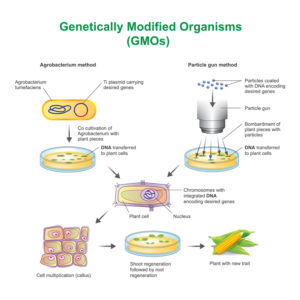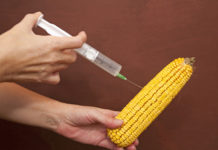As a raw foodist, you should be more concerned about how to avoid GMO foods (Genetically Modified Organisms) than anyone else. Being a raw foodist requires that you maximize the purity, bio-availability and nutrient density of absolutely everything you consume, both foods and drinks. Anything less and it just won’t work – you’ll get hungry, cravings, and go on junk food binges … eventually building up a resentment for raw food and just giving up. I’ve not only seen it happen, it has happened to me. I just pick myself up and start again, like any other diet program.
However, when you eat nutritionally dense raw foods that don’t overload your immune system with toxic chemicals and foreign DNA it can’t digest, the opposite happens — you feel completely satisfied with simple, delicious, nutrient-dense meals, overcome your old food addictions, feel more energy and enjoy what you actual do choose to eat more than ever!
To avoid GMO foods is more important than ever. GMO’s are such a significant health threat these days that I’ve arranged to include a regular column on this website by my dear friend Jeffrey Smith, the world’s foremost anti-GMO advocate and founder of the Institute for Responsible Technology.
GMO Basics by Jeffrey Smith
 A GMO (genetically modified organism) is the result of a laboratory process where genes from the DNA of one species are extracted and artificially forced into the genes of an unrelated plant or animal. The foreign genes may come from bacteria, viruses, insects, animals or even humans. Because this involves the transfer of genes, GMO’s are also known as “transgenic” organisms.
A GMO (genetically modified organism) is the result of a laboratory process where genes from the DNA of one species are extracted and artificially forced into the genes of an unrelated plant or animal. The foreign genes may come from bacteria, viruses, insects, animals or even humans. Because this involves the transfer of genes, GMO’s are also known as “transgenic” organisms.
Today, its can be hard to avoid GMO foods. GMO’s can be found In most of the food you see at the supermarket, except for items actually labeled non-GMO or organic. First introduced into the food supply in the mid-1990s, GMO’s are now present in the majority of processed foods in the U.S. While they are banned in much of Europe and elsewhere, in America the FDA doesn’t even require the listing of GMO’s on labels.
The main traits that have been added to food with genetic modification are herbicide tolerance, the ability for plants produce their own pesticides and improved productivity. These new traits have no health benefits at all — only an economic benefit. In fact, the nutritional content of the GMO foods is hardly a concern at all.
Just try to avoid GMO foods with virtually all the commercialized GMO’s now in the U.S. — including most soy (93%), cotton (93%), canola (90%), corn (87%), sugar beets (95%), Hawaiian papaya (more than 50%), zucchini and yellow squash (small amount), and even tobacco (Quest brand). Products derived from the above crops include oils from all four, soy protein, soy lecithin, cornstarch, corn syrup and high fructose corn syrup among others. There are also many “invisible ingredients,” derived from GMO crops that are not obviously from corn or soy.
Genetically modified foods have been linked to toxic and allergic reactions, sick, sterile, and dead livestock, and damage to virtually every organ studied in lab animals. The effects on humans of consuming these new combinations of proteins produced in GMO’s are unknown and have not been studied.
Crops such as Bt cotton produce pesticides inside the plant. This kills or deters insects…. The plants themselves are toxic, and not just to insects. Farmers in India, who let their sheep graze on Bt cotton after the harvest saw thousands of sheep die! Comparative studies on the toxic residues in foods from such crops have not yet been done. Pollen from GM crops can contaminate nearby crops of the same type…. In fact, virtually all heritage varieties of corn in Mexico… have been found to have some contamination. The long-term effects on the environment could be disastrous.
Reasons to Avoid GMO’s by Jeffrey Smith
- GMO’s are extremely unhealthy. The American Academy of Environmental Medicine urges doctors to prescribe non-GMO diets for all patients. They cite animal studies showing organ damage, gastrointestinal and immune system disorders, accelerated aging, and infertility. Human studies show how genetically modified (GMO) foods leave material behind inside us, such as glyphosate, possibly causing long-term problems. Then genes from GMO soy can find their way into the DNA of bacteria living inside us. For example, the toxic insecticide produced by GMO corn was found in the blood of pregnant women and their unborn fetuses.
 Numerous health problems increased after GMO’s were introduced in 1996. The percentage of Americans with three or more chronic illnesses jumped from 7% to 13% in just 9 years. Food allergies skyrocketed through the roof. Once rare disorders like autism, digestive problems, reproductive disorders and others are on rising. Groups like the AAEM tell us not to wait before we do something to protect ourselves and our children.
Numerous health problems increased after GMO’s were introduced in 1996. The percentage of Americans with three or more chronic illnesses jumped from 7% to 13% in just 9 years. Food allergies skyrocketed through the roof. Once rare disorders like autism, digestive problems, reproductive disorders and others are on rising. Groups like the AAEM tell us not to wait before we do something to protect ourselves and our children. - GMOs contaminate forever. GMO’s cross pollinate and their seeds can travel on the wind for many miles, often contaminating nearby organic and non-GMO farms — putting those farmers out of business. Worse, Monsanto may even try to sue those farmers for patent infringement! GMO pollution is ultimately more damaging and dangerous than any other environmental concern including global warming and nuclear waste, threatening the health of several future generations.
- GMOs increase herbicide use. Glyphosate, the active ingredient in Monsanto’s popular Roundup weed killer, has now officially been added to California’s list of chemicals known to cause cancer (CA Office of Environmental Health Hazard Assessment). The listing is the latest legal setback for Monsanto which has been facing increased lawsuits over glyphosate since the World Health Organization’s International Agency for Research on Cancer said that it is “probably carcinogenic” in 2015. Listing glyphosate as a known carcinogen in California will require the chemical to have warning labels. Warnings would also be required if glyphosate is being sprayed at unsafe levels by landscapers, golf courses, orchards, vineyards and farms. Glyphosate producers have about a year to re-label products or remove them from shelves if further legal challenges are lost.
- GMO crops are engineered to be “herbicide tolerant.” Monsanto’s Roundup Ready crops, for example, are genetically-engineered to survive extremely heavy applications of Roundup herbicide — which means Monsanto now sells 3 times more Roundup than before! However, overuse of Roundup has now produced “super weeds” resistant to the herbicide. This causes farmers to use even more toxic herbicides and even more heam to the environment. Monsanto’s GMO foods contain higher residues of Roundup linked with sterility, hormone disruption, birth defects, and cancer. Glyphosate, supposedly biodegradable in the environment, has also been found is blood test of most people around the world!
- Genetic engineering creates dangerous side effects. By mixing genes from totally unrelated species, genetic engineering unleashes a host of unpredictable side effects. Moreover, irrespective of the type of genes that are inserted, the very process of creating a GM plant can result in massive collateral damage that produces new toxins, allergens, carcinogens, and nutritional deficiencies.
- Government oversight is dangerously lax. Most of the health and environmental risks of GMO’s are ignored by the government. The reason for this is largely political. The US Food and Drug Administration (FDA), for example, doesn’t require a single safety study, does not mandate labeling of GMO’s, and allows companies to put their GMO foods onto the market without even notifying the agency. Their justification was the claim that they had no information showing that GMO foods were substantially different. But this was a lie. Secret agency memos made public by a lawsuit show that the overwhelming consensus even among the FDA’s own scientists was that GMO’s can create unpredictable, hard-to-detect side effects. They urged long-term safety studies. But the government was instructed to promote biotechnology respite the dangers.
- The biotech industry uses “tobacco science” to claim product safety. Biotech companies like Monsanto told us that Agent Orange, PCB’s, and DDT were safe. They are now using the same type of superficial, rigged research to try and convince us that GMOs are safe. Independent scientists, however, have demonstrated without a doubt how industry-funded research is designed to avoid finding problems and how adverse findings are distorted or denied. Independent research and reporting is attacked and suppressed. Scientists who discover problems with GMO’s have been gagged, fired, threatened and denied funding. The journal Nature acknowledged that a “large block of scientists . . . denigrate research by other legitimate scientists in a knee-jerk, partisan, emotional way that is not helpful in advancing knowledge.” No major media are trying to expose the problems since they are often bought and paid for by Monsanto and Friends.
- GMOs harm the environment. GMO crops and associated herbicides can harm birds, insects, amphibians, marine ecosystems, and soil organisms. They reduce bio-diversity, pollute water resources, and are unsustainable. For example, GMO crops are eliminating the habitat for monarch butterflies, whose populations have been cut down 50% in the US. Monsanto’s Roundup herbicide has been shown to cause birth defects in amphibians, embryonic deaths and endocrine disruptions and organ damage in animals even at very low doses. GMO canola has been found growing wild in several states, threatening to pass on its herbicide tolerant genes on to weeds.
- GMOs do not increase yields, and work against feeding a hungry world. While sustainable non-GMO agriculture in developing countries is clearly resulting in yield increases of 79% and higher, GMO’s do not, on average, increase yields at all. This was evident in the Union of Concerned Scientists’ 2009 report Failure to Yield—the definitive study to date on GM crops and yield. The International Assessment of Agricultural Knowledge, Science and Technology for Development (IAASTD) report, authored by more than 400 scientists and backed by 58 governments, stated that GMO crop yields were “highly variable” and in some cases, “yields declined.” The report noted, “Assessment of the technology lags behind its development, information is anecdotal and contradictory, and uncertainty about possible benefits and damage is unavoidable.” They determined that the current GMO’s have nothing to offer the goals of reducing hunger and poverty, improving nutrition, health and rural livelihoods, and facilitating social and environmental sustainability. On the contrary, GMO’s divert money and resources that would otherwise be spent on more safe, reliable, and appropriate technologies.
- By avoiding GMOs, you contribute to the coming tipping point of consumer rejection, forcing them out of our food supply. Because GMO’s offer no consumer benefits, if even a small percentage of us start rejecting brands that contain them, GM ingredients will become a marketing liability. Food companies will kick them out. In Europe, for example, the tipping point was achieved in 1999, just after a high profile GMO safety scandal hit the papers and alerted citizens to the potential dangers. In the US, a consumer rebellion against GM bovine growth hormone has also reached a tipping point, kicked the cow drug out of dairy products by WalMart, Starbucks, Dannon, Yoplait, and most of America’s dairies. NOTE: As an additional motivation to avoid GMOs, you may wish to take a lesson from the animals. Eyewitness reports from around the world describe several situations where animals, when given a choice, avoid genetically modified food. These include cows, pigs, geese, elk, deer, raccoons, mice, rats, squirrels, chicken, and buffalo. We’re pretty sure the animals didn’t read the above 10 reasons.
The Campaign for Healthier Eating in America is designed to achieve a tipping point against GMO’s in the US. The number of non-GMO shoppers needed is probably just 5% of the population. The key is to educate consumers about the documented health dangers and provide a Non-GMO Shopping Guide to make avoiding GMO’s much easier. Please choose healthier non-GMO brands, tell others about GMO’s so they can do the same, and join the Non-GMO Tipping Point Netwooundup. Together we can quickly reclaim a healthier non-GMO food supply.
 The world’s leading consumer advocate for non-GMO choices, Jeffrey M. Smith, is the creator of the world’s best selling books and videos on the dangers of genetically modified organisms (GMO’s). Jeffrey exposes how biotech companies mislead consumers, legislators and safety officials to put everyone’s health in peril. Jeffrey founded the Institute for Responsible Technology in 2003.
The world’s leading consumer advocate for non-GMO choices, Jeffrey M. Smith, is the creator of the world’s best selling books and videos on the dangers of genetically modified organisms (GMO’s). Jeffrey exposes how biotech companies mislead consumers, legislators and safety officials to put everyone’s health in peril. Jeffrey founded the Institute for Responsible Technology in 2003.
Also Read:

















